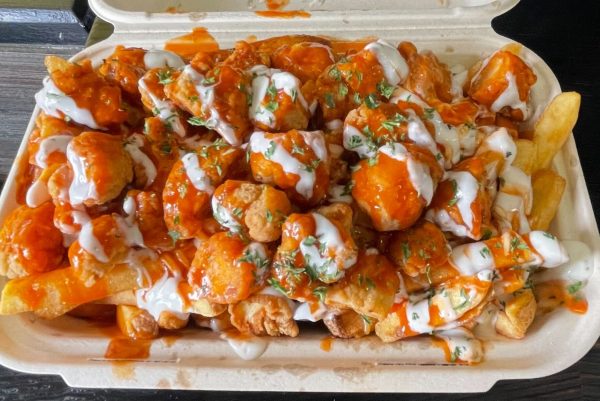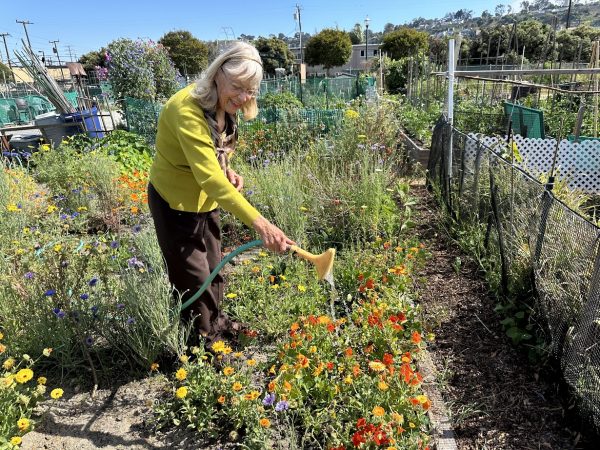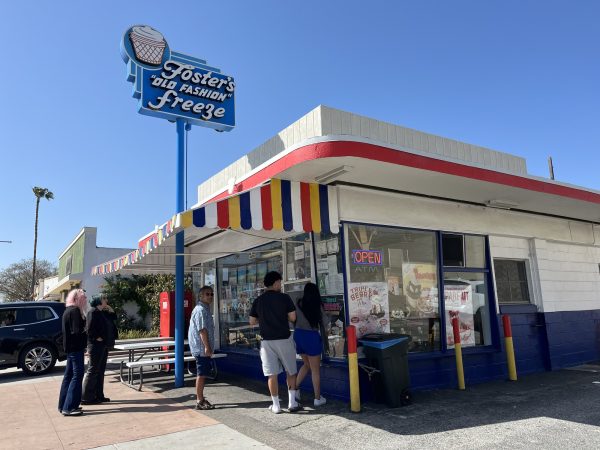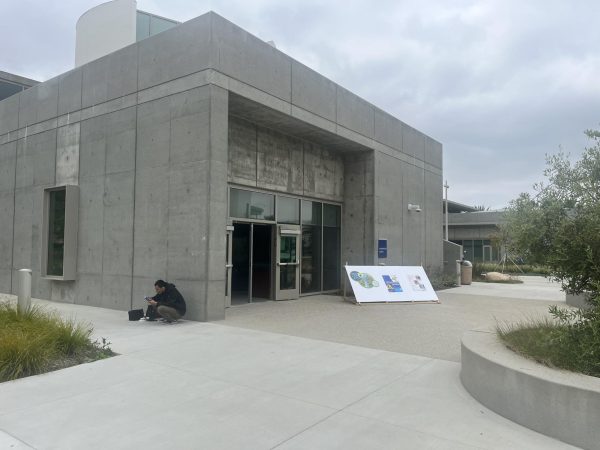Stories from our communities: Part four
Nearly one year into the Coronavirus pandemic, our reporters have been covering the human experience and El Camino College from their own homes rather than the newsroom for almost two semesters. As the world begins the road to recovery from COVID-19, there are still business owners and everyday people who are suffering from shut-downs emotionally and financially.
This is a collaborative piece, showcasing the people within our communities who are working through the pandemic in whatever way they can. Parts one, two and three of this series can be found on eccunion.com.
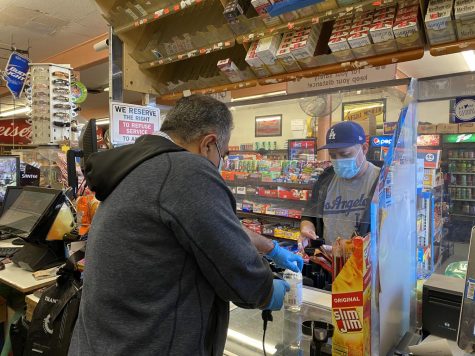
4:30 p.m. | Catalina Market, Torrance
By: Abigail Puentes
Hours were cut for the Catalina Market, but business was booming in the beginning of the pandemic.
Torrance residents mainly came to the liquor store for snacks, food or drinks, but things changed in March of 2020. Due to COVID-19, customers would come in panicking for cleaning supplies, making sanitizing supplies go quicker than ever, Catalina Market owner, 58-year-old Alex Gonzalez said.
“Towards the middle of the year, we couldn’t get supplies for the store, making business slow down significantly,” Gonzalez said.
Gonzalez said he has been diligently practicing guidelines by the Centers for Disease Control and Prevention like adding markers on the ground every six feet, posting “mask required” signs around the store and placing a glass shield between him and his customers.
“It’s super stressful working during a pandemic, especially running the business on my own,” Gonzalez said. “Having to wear a mask for 12 hours a day and dealing with customers that came in with no mask can be frustrating.”
After closing, Gonzalez said he is super cautious and is sure to clean and sanitize everything before leaving the store.
“I have learned from many customers that they have lost family members, which is saddening,” Gonzalez said. “I’ve learned that life is too short and I now appreciate life everyday.”
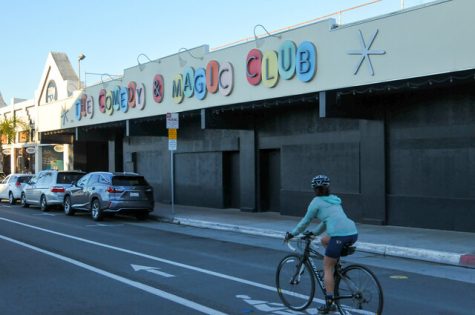
6 p.m. | The Comedy and Magic Club, Hermosa Beach Pier
By: Walter Jay Jr.
The Comedy & Magic Club has been boarded up and painted black since pandemic-related shut-downs in March 2020. The façade, now more symbolic of a funeral than a place that brought laughter, joy and elation to millions over it’s 41 year history.
A year ago you could step inside and stand on the orange and yellow psychedelic carpet, stained with the sweet musk of spilled two-drink minimums, as a wall of ambient noise came crashing down around you.
The energy that brought life to the CMC is all but a thing of the past. Another casualty of COVID-19.
“It’s sad, you know? To see something that was so lively and such a great contribution to the community, just sit at a standstill,” Duane Sinclair, 42 year-old former CMC employee said.
Sinclair was the club’s sound engineer and DJ, and was in charge of creating the nightly high-energy ambiance. He occasionally drives by the CMC and reminisces about those days.
“You walk through the halls of that place and you see the history,” Sinclair said. “It could be a regular night, and you just have someone like Chris Tucker pop up. It’s one of those things. You get like these goosebumps.”
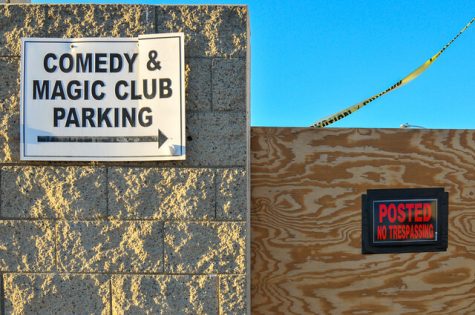
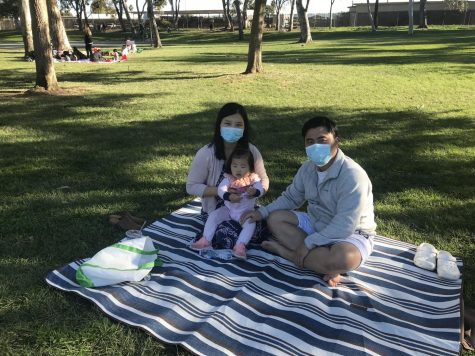
3:30 p.m | Charles H. Wilson Park, Torrance
By: Maureen Linzaga
A cold breeze wafts through the air, yet the sun still shines over Charles H. Wilson Park’s amenities and visitors. Childrens’ laughter, music blasting on speakers and distant chatter can be heard from every direction.
Wilson Park is slowly returning to its usual crowded, bustling state from before the COVID-19 pandemic happened, due to the recent reopening of Torrance’s outdoor playgrounds on Dec. 10.
Many Torrance residents like Alex Kim take advantage of this opportunity for family recreation and a few minutes of outdoor time as social distancing rules continue to be implemented in the park and throughout Los Angeles County.
“We like this, we like it here,” Kim said, his extended palm pointing around the park. “Hanging around with my daughter, simple chatting like nothing has really changed and things are still normal.”
Although the reservable seated picnic area of Wilson Park is currently closed, Kim, his wife Yeongyeun and their daughter Shiny sit cross-legged on their laid-out picnic mat.
“On top of that, my daughter is only 15 months old so she has a lot of energy in her. We try to just get her out in nature and to play around when we can because they need it at this age.” Kim said.
The pandemic rages on, and with it so does the mask mandate.
“Because we wear the masks when going out, it is really a hindrance. But we need it so we can enjoy outside like before.” Kim said.
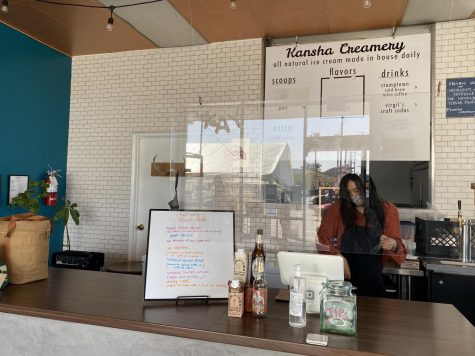
1:47 p.m. | Kansha Creamery, Torrance
By: Madison Phan
In the corner of a small plaza sitting across the South Bay Toyota dealership, an ice cream shop plays lively music to welcome its customers in.
A woman in a red blouse, a black apron and a white floral mask stands behind the counter, ready to happily greet the ice cream-craving customers.
Kansha Creamery, owned by a brother and sister duo, has continued to serve its customers throughout the COVID-19 pandemic but had to make changes to its usual operations.
“We can’t do dine-in, or scooping or anything, so we’ve just been selling pints to-go,” partial owner, 30-year-old Lomita resident Elaine Marumoto-Perez, said.
Unlike other ice cream shops that scoop their customers’ ice cream based on the flavors they want, Kansha Creamery fills pints of ice cream in the morning and sells them for $10 each. They’ve also opened up an online store where customers can order and pay for in-store pick-up, providing them with a contactless option.
“[COVID-19] hasn’t been negatively affecting our business,” Marumoto-Perez said. “We’ve been getting a lot of support from our followers.”
While the pandemic may have changed some peoples’ lives for the worse, Marumoto-Perez said she hopes that people, including herself, learn to develop a deeper appreciation of the slow life.
“I feel like before COVID-19, everything was very fast and quick,” Marumoto-Perez said. “Now, you kind of appreciate the slowing down, and seeing your loved ones and things like that.”
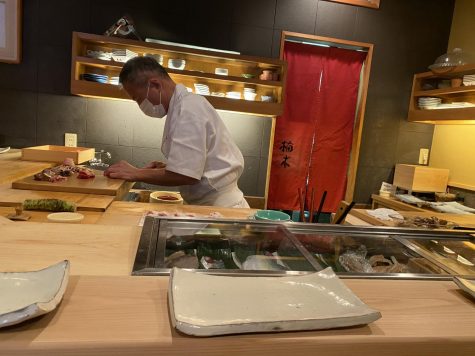
1:00p.m. | Kusumoto, Japan
By: Mana Tsumoto
Hide Kusumoto works wearing a face mask as he prepares face mask cases for customers, his restaurant is small and has only counter seats, so he decided to restrict capacity for the safety of his patrons.
As Japan has been declared a second state of emergency until March 7, restaurants are required to close by 8 p.m. and end serving alcohol by 7 p.m. Most private restaurants didn’t start selling items off a takeout menu before the stay-at-home order but recently, they decided to sell lunch boxes to make money. Kusumoto has joined this trend with their own lunch box.
“[We] normally want customers to eat in front of us because we want to see their face, how they would think about the taste and we want customers to eat fresh sushi. However, money is very important so we had no choice but to sell lunch box. Hopefully, we want to work as usual.” Kusumoto said.

3:10 p.m | West Century Boulevard
By: Jeniffer Torres
When the light turns red, Juanita Sajché steps onto the road, weaving between cars to sell flower bouquets.
Sajché lost her job as a hotel housekeeper due to COVID-19 almost a year ago. To maintain herself and her two sons, she sells flowers on the weekends and prepares meals during the week.
“It affected [my family] a lot, this sickness,” she said in Spanish. “Many of my family members got laid off. Most of all, they’re not really working a full 40 hours [a week].”
Sajché got the idea to start selling flowers from a friend who owns a flower shop and works making arrangements.
“According to him, since he got to this country, he dedicated himself to selling flowers,” Sajché said.
Selling flowers on the weekend yields little money for Sajché, but she said it all goes to her family’s necessities like rent, food and utility bills. The youngest of her two sons, a 16-year-old, works at a local fast-food restaurant where Sajché said he contracted COVID-19 a few months back.
“He’s working 20 hours [a week]. It helps a lot because if it were just me, then we couldn’t deal with the rent,” Sajché said.





